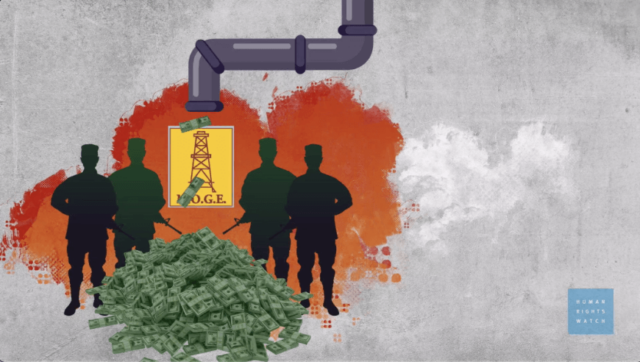Myanmar: TotalEnergies Withdraws; Junta Gains


(Paris) – Myanmar’s abusive junta will obtain an increased stake in the country’s largest oil and gas field when the French company TotalEnergies withdraws from Myanmar on July 20, 2022, Human Rights Watch said today. TotalEnergies’ shares will be divided proportionally among the remaining three partners – US-based Chevron, Thai-based PTTEP, and the junta-controlled Myanmar Oil and Gas Enterprise (MOGE).
TotalEnergies in January announced its plans to leave Myanmar in six months due to a deteriorating human rights situation that “no longer allows TotalEnergies to make a sufficiently positive contribution in the country.” The company has operated the Yadana gas project since the 1990s in partnership with Chevron and PTTEP.
“Total’s transfer of ownership shares to a military-controlled company will further enrich the junta at the expense of human rights,” said Bénédicte Jeannerod, France director at Human Rights Watch. “Other energy companies looking to exit should make sure they do so responsibly, without contributing to the junta’s coffers.”
Since the February 1, 2021 coup in Myanmar, the junta has imposed a brutal nationwide crackdown on all opposition. The junta’s widespread and systematic abuses, including mass killings, torture, arbitrary arrests, and indiscriminate attacks on civilians, amount to crimes against humanity and war crimes. Security forces have killed over 2,000 people and arbitrarily arrested over 14,000.
In March, the oil and gas project partners approved PTTEP to take over as the operator of Yadana. The division of TotalEnergies’ 31.2 percent stake in both the gas field and pipeline will leave Chevron with 41.1 percent interest, PTTEP with 37.1 percent, and MOGE with 21.8 percent. Chevron also announced plans to withdraw and has indicated its intention to sell its stake to PTTEP, though few details about its exit have been made public.
Natural gas projects in Myanmar generate over US$1 billion in foreign revenue for the junta annually, its single largest source of foreign currency revenue. The money is transmitted in US dollars to MOGE and other military-controlled bank accounts in foreign countries in the form of fees, taxes, royalties, and revenues from the export of natural gas, most of which travels by pipeline to Thailand or China.
On February 21, the European Union imposed new sanctions on junta-controlled businesses including MOGE, the first government entity to do so. However, it also issued a license with ambiguous language that seems to allow exiting companies to relinquish or transfer their shares to MOGE.
Other companies including Woodside, Mitsubishi, Petronas, and ENEOS have announced plans in recent months to withdraw at least in part from operations in Myanmar. Petronas is being replaced as operator of the Yetagun field by Gulf Petroleum Myanmar, according to reports by Myanmar Now and Justice for Myanmar.
When companies exit from Myanmar, they should place their existing shares or property rights into trust or escrow, including shares of exploration or development projects, production, or pipeline transportation ventures, to ensure the revenues from those shares do not benefit the military. If exiting companies determine that they must sell or transfer their shares to another business entity, they should ensure that those entities will respect international sanctions and follow international standards on business and human rights.
Adopting these measures would be consistent with companies’ responsibilities under the United Nations Guiding Principles on Business and Human Rights, which state that “appropriate action” in cases in which business activities are enabling rights abuses includes consideration of “whether terminating the relationship with the entity itself would have adverse human rights consequences.”
Concerned governments should join the EU in sanctioning MOGE while specifying that transfers of ownership to the junta are prohibited. The US in particular is in a key position to impose sanctions since payments in the gas sector – even those handled by non-US companies – are typically made in US dollars and require the involvement of correspondent US or EU banks to finalize, or “settle,” large dollar or Euro transactions. Additional sanctions would also help ensure that the junta is not able to evade the new EU sanctions in other jurisdictions.
PTTEP and South Korea’s POSCO, the two main energy companies remaining in Myanmar, should signal their support for such measures. The largest gas revenue payments to junta-controlled accounts are made via PTT, PTTEP’s parent company, which purchases about 80 percent of Myanmar’s exported natural gas from Yadana as well as the Zawtika gas field, which it operates itself. In April, PTTEP announced it was withdrawing from the nearly depleted Yetagun field. POSCO runs the second largest project, Shwe.
Human Rights Watch has previously written to all of these companies and their shareholders, urging them to support sanctions on gas revenues. Human Rights Watch has also urged other governments including the US, UK, Australia, and Japan to adopt the EU’s approach and sanction Myanmar’s military-owned companies such as MOGE.
“The US and other governments should follow the EU’s lead by urgently imposing measures that will cut the junta off from its millions in gas revenue before companies indifferent to rights take over the payment flows,” Jeannerod said. “Junta leaders need to face economic consequences for the atrocities they are carrying out across Myanmar.”

